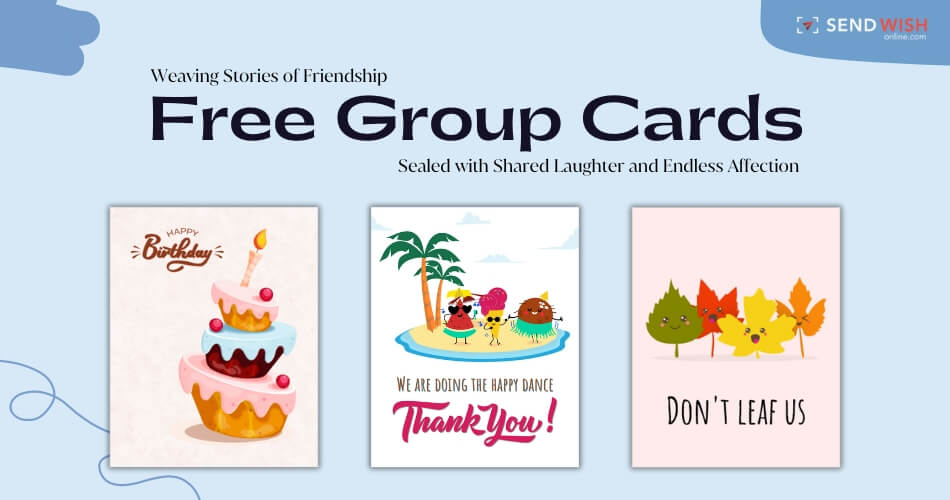Sending group greetings has long been a tradition to commemorate important milestones and events. However, the advent and evolution of group greeting cards has transformed this practice into a highly collaborative and meaningful experience. Let’s explore the history of this tradition and how digital innovations are shaping its future impact.
Origins
In the late 19th century, mass production of greeting cards first emerged alongside advancements in printing technologies. Early cards often featured generic religious imagery and verses suitable for individual senders. However, as communities grew more dispersed due to industrialization and two World Wars, the desire to collectively honor loved ones from afar arose.
In the 1950s, the concept of “group cards” was born. Family members and friends would coordinate signing one card sent on behalf of all. This allowed showing united support when physically gathering wasn’t possible. The tradition helped maintain connections between distributed communities.
Growing Significance
As populations continued urbanizing throughout the 20th century, the appeal of group cards strengthening long-distance bonds amplified. They provided a way for far-flung loved ones to jointly commemorate birthdays, anniversaries, new babies, retirements and more through one cohesive message.
By the 1990s, cards had evolved elaborate designs suited for multiple signatures. Customizable templates allowed personalizing greetings to various occasions and relationships. Coordinating group cards became a cherished ritual cementing people together through life’s passages.
Digital Transformation
Advancements in internet and mobile connectivity around the new millennium transformed group cards yet again. Digital options emerged enabling remote collaboration anytime, anywhere via online templates. Friends and families could now jointly craft cards without relying on physical proximity.
Platforms like sendwishonline.com allowed uploading photos, videos and personalized messages from different locations into one cohesive digital creation. Group cards were reimagined for the digital age through seamless online coordination.
Benefits of Today’s Group Cards
Modern group cards foster stronger social connections in several impactful ways:
Inclusiveness – Anyone can contribute regardless of distances involved through collaborative online templates.
Convenience – Busy schedules are accommodated since cards can be worked on jointly from any device at flexible times.
Creativity – Robust editing tools inspire unique designs better reflecting the group dynamic and recipient.
Sentiment – Combining individual messages creates a heartfelt collective tribute greater than the sum of its parts.
Preservation – Digital formats allow cards to become treasured mementos accessed indefinitely into the future.
As technology and social habits continue evolving, so too will the role of group cards in bringing distributed communities even closer through meaningful shared experiences and memories. Their inclusiveness will remain critical for bonding far-flung loved ones across generations.
Strengthening Social Bonds
Group cards have a profound impact on fostering stronger social connections. The act of collaborating symbolizes unity and collective support for the recipient. It creates shared ownership over the sentiment being conveyed. This reinforces feelings of belonging, care, and intimacy among contributors.
The recipient also feels especially loved and appreciated knowing so many people participated. It amplifies the emotional impact versus an individual card. Overall, the communal experience of crafting group cards is a relationship-building ritual that strengthens interpersonal bonds.
Also Check Farewell Card Online
Preserving Memories
Group cards become treasured mementos that are revisited for years, preserving happy memories and personal milestones. This helps combat loneliness and social isolation as cards trigger fond recollections of community during life’s passages. The digital archiving of cards also empowers memory-sharing across generations to foster intergenerational bonding.
Cultural Significance
Group card traditions hold cultural importance as a communal language of celebration, comfort and togetherness. They are woven into rites of passage that give occasions deeper meaning. This impact will likely grow as cards increasingly represent diverse cultures and identities. Their inclusiveness builds cultural understanding and brings varied communities closer.
Mental Well-being
The feelings of care, belonging and nostalgia derived from group cards have mental health benefits by combating stress, loneliness and isolation. Receiving one can lift mood and boost self-esteem during challenging periods. Their collaborative nature also has socialization perks that maintain cognitive functioning, especially for older adults.
Economic Opportunities
The group card market has significant economic impact as well. Billions are spent annually on their creation and consumption, supporting creative jobs. Digital platforms have further monetization potential through premium features, social commerce and targeted advertising. This activity fuels entrepreneurship and community prosperity.
From strengthening relationships to preserving memories to fostering well-being, group cards make a profound and wide-ranging positive impact on social, cultural and economic levels. Their influence will likely amplify as new digital innovations emerge to further enrich this important tradition.
Group greeting cards are an important way to strengthen social bonds and spread messages of care, especially as society becomes more dispersed. Here are some key reasons why group cards remain important:
Connection and Support
Receiving a card with well-wishes from multiple loved ones conveys a powerful sense of community support. It shows the recipient that they are cared for by their broader social network, even when physical proximity is lacking. This is increasingly vital as families spread out.
Preserving Traditions
Group cards help maintain cultural traditions surrounding important milestones. They keep multigenerational rituals like birthday celebrations meaningful even at a distance. This continuity provides stability and a sense of belonging across the lifespan.
Inclusiveness and Participation
Group cards foster inclusiveness by allowing anyone to contribute regardless of physical ability or location. No one feels left out of commemorating significant events in a loved one’s life. Their collaborative nature boosts feelings of participation.
Strengthening Memories
Combined with digital archiving, group cards become treasured mementos that strengthen interpersonal memories over the years. Revisiting past cards triggers fond recollections that combat loneliness and social isolation.
Mental Well-Being
The feelings of care, belonging and nostalgia derived from collaboratively crafted cards and their delivery have mental health benefits. Receiving one can lift mood and boost self-esteem during challenging periods.
As such, group cards remain a meaningful ritual that brings dispersed communities together through life’s passages. Their importance will likely grow as digital innovations make them even more inclusive and memory-preserving for geographically distant loved ones. Sustaining this tradition nurtures important social-emotional needs.




